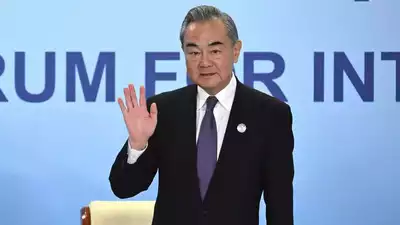China’s foreign minister has told his Israeli counterpart that all countries have a right to self-defence, but they must protect civilians and abide by international law, Beijing said Tuesday.
Wang Yi made the comments in a call on Monday with Israeli Foreign Minister Eli Cohen, the first between them since the start of the Israel-Hamas war.
Hamas militants stormed into Israel from the Gaza Strip on October 7, and killed at least 1,400 people, mostly who were shot or burnt to death on the first day of the raid, according to Israeli officials.
Israel says around 1,500 Hamas fighters were killed in clashes before its army regained control of the area under attack.
More than 5,000 Palestinians, mainly civilians, have been killed across the Gaza Strip in relentless Israeli bombardments in retaliation for the attacks, according to the latest toll from Gaza’s Hamas-run health ministry.
In his talks with Cohen, Wang said China was deeply concerned about the “ongoing escalation of the conflict”.
“All countries have the right to self-defence, but they should abide by international humanitarian law and protect the safety of civilians,” Wang said.
“The most pressing task now is to prevent the situation from escalating further and from leading to a more serious humanitarian disaster.”
Wang had already said on October 14 that Israel’s actions had gone “beyond the scope of self defence” and called then for Israel to stop its “collective punishment” of people in Gaza.
Washington has said it hopes China’s relationship with Hamas backer Iran could help calm the conflict, particularly after Beijing brokered a detente between Tehran and its long-time foe Saudi Arabia this year.
On the Israeli-Palestinian conflict, China has historically been sympathetic to the Palestinians and backed a two-state solution.
In his talks with Cohen, Wang reiterated Beijing’s longstanding position, saying that China “sincerely hopes that the Palestine issue will be resolved in a comprehensive and just manner… and that the legitimate security concerns of all parties will be resolved in a genuine and thorough manner”.
Also on Monday, Wang spoke with his Palestinian Authority (PA) counterpart, Riyad al-Maliki, telling him Beijing “deeply expresses its sympathy with the Palestinian side”.
The PA, which Maliki represents, was meant to be a first step towards an independent Palestinian state.
But it has little authority over the West Bank and none over Gaza, where it was violently ousted by Hamas in 2007.
“What the people of Gaza need most at present is security and food and medicine, not war and weapons and ammunition,” Wang told Maliki.
“What the Gaza Strip needs most is efforts to stop the war and promote peace, not geopolitical calculations,” he said.
“The Chinese side has always campaigned for a ceasefire and an end to violence, and has called for a return to peace.”
China’s Middle East envoy Zhai Jun is in the region this week, a visit that Beijing has said is aimed at “cooling down” the war.
Speaking at an Egypt-hosted “summit for peace” on Saturday, Zhai called for an “immediate ceasefire and an end to the fighting as quickly as possible”.
So far, he has also visited Qatar — which hosts a Hamas political office — and the United Arab Emirates.















































